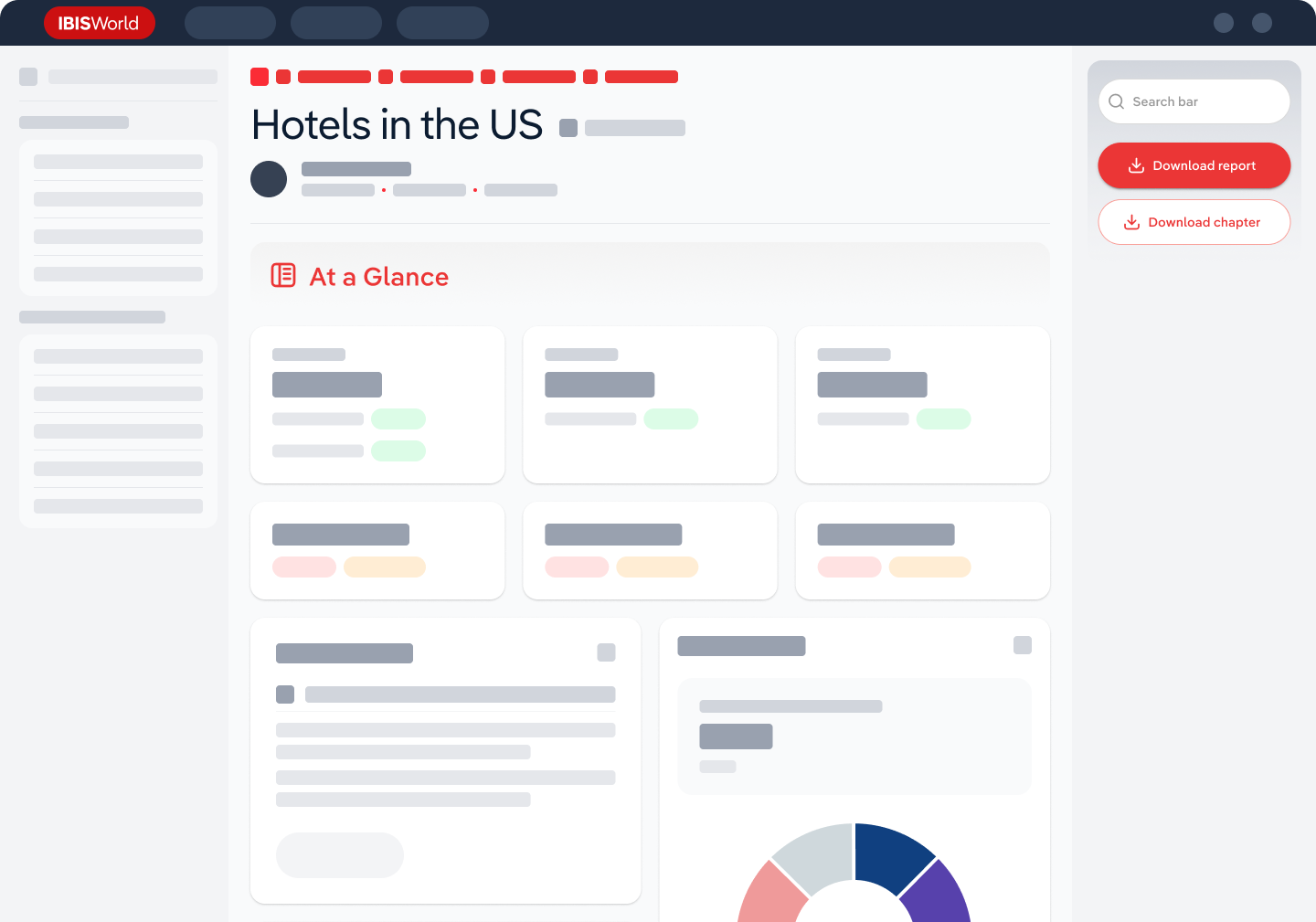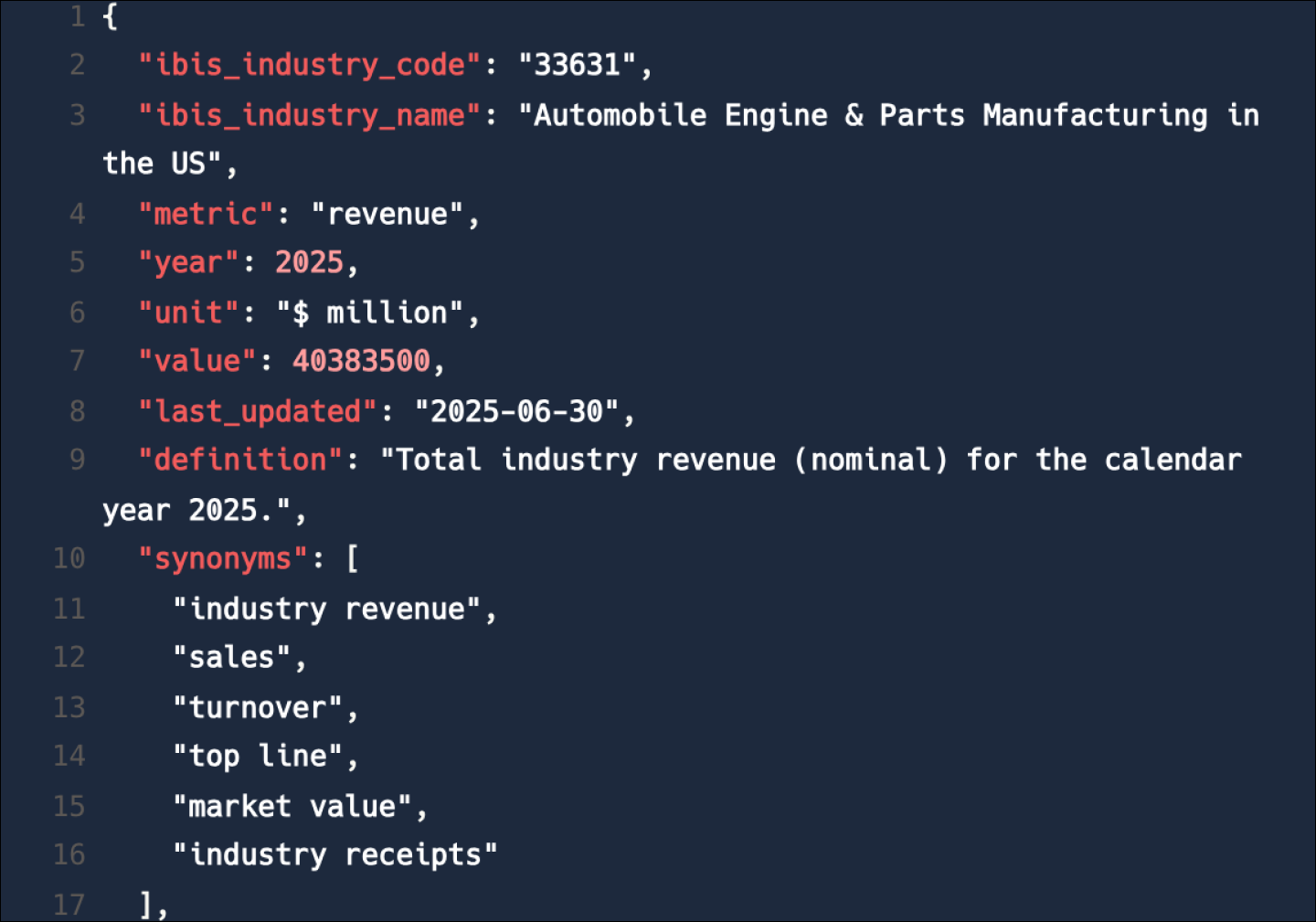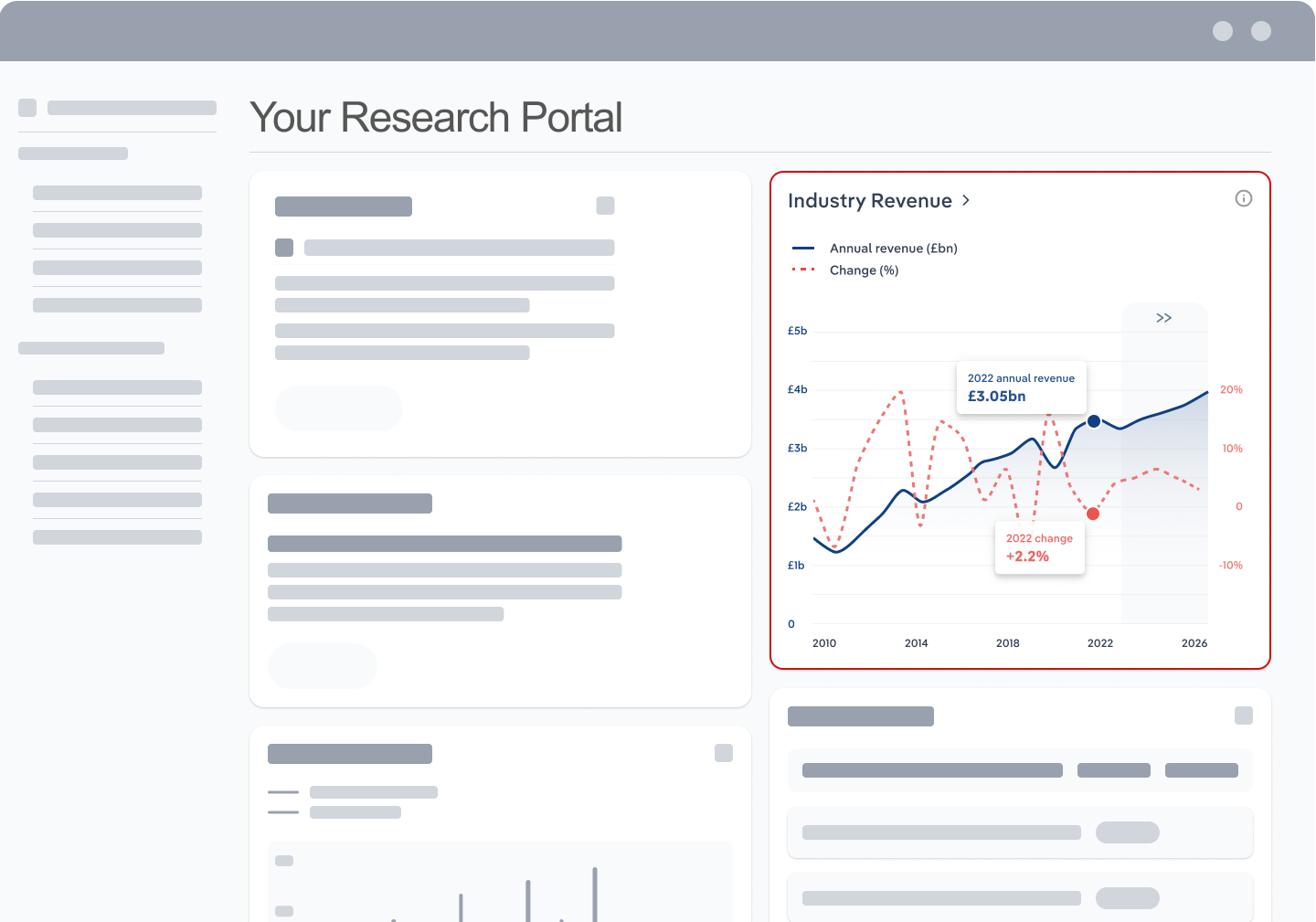Industry Statistics and Trends
Market size and recent performance (2015-2030)
Industry revenue has declined at a CAGR of 0.8 % over the past five years, to reach an estimated €2.5bn in 2025.
Trends and Insights
The production of wooden packaging is an important indicator of the economy
- Wood packaging is one of the most universal aids in industry, trade and logistics. Demand for the industry's products depends on many different factors, but the production level of the domestic economy and the business activities of wholesalers and retailers are the clear determining factors.
- Additional trends and insights available with purchase
Industry outlook (2026-2031)
Market size is projected to grow over the next five years.
Trends and Insights
The new EU packaging regulation increases the documentation requirements for transport packaging
- The adoption of EU Regulation 2024/1610 on packaging and packaging waste, better known as the PPWR (Packaging and Packaging Waste Regulation), by the European Union institutions in December 2024 will bring far-reaching changes for industry players. In the coming years, manufacturers of transport packaging will have to better document where their packaging comes from, how it has been processed and what environmental footprint it leaves behind.
Biggest companies in the Wooden Container Manufacturing in Germany
| Company | Market Share (%)
2025 | Revenue (€m)
2025 |
|---|---|---|
Mercer Torgau GmbH & Co. KG | 98.0 | |
Wilhelm Schaffranick GmbH & Co. KG | 55.0 | |
Paletten-Service Hamburg AG | 46.0 |
To view the market share and analysis for all 4 top companies in this industry, view purchase options.
Products & Services Segmentation
Industry revenue is measured across several distinct product and services lines, including Flat pallets, Plywood boxes and Box pallets. Flat pallets is the largest segment of the Wooden Container Manufacturing in Germany.
Trends and Insights
Flat pallets are by far the most important product category in the wooden packaging industry
- Since their establishment in the 1950s, flat pallets have been a key material handling aid and have become an integral part of modern production and logistics processes. A basic distinction can be made between reusable and disposable pallets.
- More insights available in the full report
Table of Contents
About this industry
Industry definition
The industry for the manufacture of wooden crates and pallets includes all companies that process wood into packaging and transport aids. This primarily includes pallets and other logistics products such as plywood and solid wood crates as well as wooden export packaging. The production of wooden cable drums, wooden drums and other wooden goods is also part of the industry.
What's included in this industry?
Products and services covered in the Wooden Container Manufacturing industry in Germany include Production of pallets and other wooden load carriers, Manufacture of wooden transport containers and packaging materials, Production of boxes, crates and drums made of wood and Production of barrels and other wooden cooperage products.Companies
Companies covered in the Wooden Container Manufacturing industry in Germany include Mercer Torgau GmbH & Co. KG, Wilhelm Schaffranick GmbH & Co. KG and Paletten-Service Hamburg AG.Purchase this report to view all 4 major companies in this industry.
Related Terms
Related terms covered in the Wooden Container Manufacturing industry in Germany include palette pool, europool and just-in-time.Industry Code
WZ 16.24 - Wooden Container Manufacturing in Germany
Performance
Get an indication of the industry's health through historical, current and forward-looking trends in the performance indicators that make or break businesses.
Analyst insights
Wood is the dominant material for transport packaging in the pallet product segment. The classic Europool pallet is of particular importance for the European economy.
In this chapter (4)
- Current Performance
- Outlook
- Volatility
- Life Cycle
Key metrics
- Annual Revenue, Recent Growth, Forecast, Revenue Volatility
- Number of Employees, Recent Growth, Forecast, Employees per Business, Revenue per Employee
- Number of Businesses, Recent Growth, Forecast, Employees per Business, Revenue per Business
- Total Profit, Profit Margin, Profit per Business
Charts
- Revenue, including historical (2015-2024) and forecast (2025-2030)
- Employees, including historical (2015-2024) and forecast (2025-2030)
- Businesses, including historical (2015-2024) and forecast (2025-2030)
- Profit, including historical (2015-2025)
- Industry Volatility vs. Revenue Growth
- Industry Life Cycle
Detailed analysis
- Trends in supply, demand and current events that are driving current industry performance
- Expected trends, economic factors and ongoing events that drive the industry's outlook
- Key success factors for businesses to overcome volatility
- How contribution to GDP, industry saturation, innovation, consolidation, and technology and systems influence the industry's life cycle phase.
Products and Markets
Learn about an industry's products and services, markets and trends in international trade.
Analyst insight
Flat pallets are by far the most important product category in the wooden packaging industry. Since their establishment in the 1950s, flat pallets have been a key material ha...
In this chapter
- Products & Services
- Major Markets
- International Trade
Key metrics
- Largest market segment and value in 2025
- Product innovation level
- Total imports, level and trend
- Total exports, level and trend
- Trade Balance
Charts
- Products & services segmentation in 2025
- Major market segmentation in 2025
- International trade, including imports by country and exports by country
Detailed analysis
- Trends impacting the recent performance of the industry's various segments
- Innovations in the industry's product or service offering, specialization or delivery method
- Key factors that successful businesses consider in their offerings
- Buying segments and key trends influencing demand for industry products and services
- Recent trends in import and export volumes, country of origin or destination, and expected future trends
Geographic Breakdown
Discover where business activity is most concentrated in an industry and the factors driving these trends to find opportunities and conduct regional benchmarking.
Analyst insights
The largest proportion of companies relevant to the industry are located in the centre region. Wood packaging manufacturers generally settle in areas where demand is generate...
In this chapter (1)
- Business Locations
Charts
- Share of revenue, establishment, wages and employment in each region
- Share of population compared to establishments in each region in 2025
Tables
- Number and share of establishments in each region in 2025
- Number and share of revenue each region accounts for in 2025
- Number and share of wages each region accounts for in 2025
- Number and share of employees in each region in 2025
Detailed analysis
- Geographic spread of the industry across Europe, and trends associated with changes in the business landscape
- Key success factors for businesses to use location to their advantage
Competitive Forces
Get data and insights on what's driving competition in an industry and the challenges industry operators and new entrants may face, with analysis built around Porter's Five Forces framework.
Analyst insights
The industry companies primarily compete with each other on price, delivery speed and delivery reliability. Although the industry products are fairly simple products, the qua...
In this chapter (4)
- Concentration
- Barriers to Entry
- Substitutes
- Buyer & Supplier Analysis
Key metrics
- Industry concentration level
- Industry competition level and trend
- Barriers to entry level and trend
- Substitutes level and trend
- Buyer power level and trend
- Supplier power level and trend
Charts
- Market share concentration among the top 4 suppliers from 2020-2025
- Supply chain including upstream supplying industries and downstream buying industries, flow chart
Detailed analysis
- Factors impacting the industry’s level of concentration, such as business distribution, new entrants, or merger and acquisition activity.
- Key success factors for businesses to manage the competitive environment of the industry.
- Challenges that potential industry entrants face such as legal, start-up costs, differentiation, labor/capital intensity and capital expenses.
- Key success factors for potential entrants to overcome barriers to entry.
- Competitive threats from potential substitutes for the industry’s own products and services.
- Key success factors for how successful businesses can compete with substitutes.
- Advantages that buyers have to keep favorable purchasing conditions.
- Advantages that suppliers have to maintain favorable selling conditions.
- Key success factors for how businesses can navigate buyer and supplier power.
Companies
Learn about the performance of the top companies in the industry.
Analyst insights
Mercer Torgau GmbH & Co KG is one of the largest wood processing companies in Germany. The company employs around 800 people and is the largest European manufacturer of Europ...
In this chapter
- Market Share Concentration
- Companies
- Company Spotlights
Charts
- Industry market share by company in 2021 through 2025
- Major companies in the industry, including market share, revenue, profit and profit margin in 2025
- Overview of Mercer Torgau GmbH & Co. KG's performance by revenue, market share and profit margin from 2019 through 2025
- Overview of Wilhelm Schaffranick GmbH & Co. KG's performance by revenue, market share and profit margin from 2019 through 2025
- Overview of Paletten-Service Hamburg AG's performance by revenue, market share and profit margin from 2019 through 2025
- Overview of revenue, market share and profit margin trend for one additional company
Detailed analysis
- Description and key data for Mercer Torgau GmbH & Co. KG, and factors influencing its performance in the industry
- Description and key data for Wilhelm Schaffranick GmbH & Co. KG, and factors influencing its performance in the industry
- Description and key data for Paletten-Service Hamburg AG, and factors influencing its performance in the industry
- Description, key data and performance trends for one additional company
External Environment
Understand the demographic, economic and regulatory factors that shape how businesses in an industry perform.
Analyst insights
A positive business climate offers industry players the potential to increase their sales. Due to the integral role that wooden load carriers play in modern logistics, sales ...
In this chapter
- External Drivers
- Regulation & Policy
- Assistance
Key metrics
- Regulation & policy level and trend
- Assistance level and trend
Charts
- Regulation & Policy historical data and forecast (2015-2030)
- Assistance historical data and forecast (2015-2030)
Detailed analysis
- Demographic and macroeconomic factors influencing the industry, including Regulation & Policy and Assistance
- Major types of regulations, regulatory bodies, industry standards or specific regulations impacting requirements for industry operators
- Key governmental and non-governmental groups or policies that may provide some relief for industry operators.
Financial Benchmarks
View average costs for industry operators and compare financial data against an industry's financial benchmarks over time.
Analyst insights
Company-specific profit margins can sometimes vary greatly. Industry players that specialise in specific products or services, such as the production of special packaging, ca...
In this chapter
- Cost Structure
- Financial Ratios
- Key Ratios
Key metrics
- Profit margin, and how it compares to the sector-wide margin
- Average wages, and how it compares to the sector-wide average wage
- Largest cost component as a percentage of revenue
- Industry average ratios for days' receivables, industry coverage and debt-to-net-worth ratio
Charts
- Average industry operating costs as a share of revenue, including purchases, wages, depreciation, utilities, rent, other costs and profit in 2025
- Average sector operating costs as a share of revenue, including purchases, wages, depreciation, utilities, rent, other costs and profit in 2025
- Investment vs. share of economy
Data tables
- Cash Flow & Debt Service Ratios (2015-2030)
- Revenue per Employee (2015-2030)
- Revenue per Enterprise (2015-2030)
- Employees per Establishment (2015-2030)
- Employees per Enterprise (2015-2030)
- Average Wage (2015-2030)
- Wages/Revenue (2015-2030)
- Establishments per Enterprise (2015-2030)
- IVA/Revenue (2015-2030)
- Imports/Demand (2015-2030)
- Exports/Revenue (2015-2030)
Detailed analysis
- Trends in the cost component for industry operators and their impact on industry costs and profitability
Key Statistics
Industry Data
Data Tables
Including values and annual change:
- Revenue (2015-2030)
- IVA (2015-2030)
- Establishments (2015-2030)
- Enterprises (2015-2030)
- Employment (2015-2030)
- Exports (2015-2030)
- Imports (2015-2030)
- Wages (2015-2030)
Top Questions Answered
Unlock comprehensive answers and precise data upon purchase. View purchase options.
What is the market size of the Wooden Container Manufacturing industry in Germany in 2026?
The market size of the Wooden Container Manufacturing industry in Germany is €2.5bn in 2026.
How many businesses are there in the Wooden Container Manufacturing industry in Germany in 2025?
There are 783 businesses in the Wooden Container Manufacturing industry in Germany, which has declined at a CAGR of 1.2 % between 2020 and 2025.
How may import tariffs affect the Wooden Container Manufacturing industry in Germany?
The Wooden Container Manufacturing industry in Germany is likely to be impacted by import tariffs with imports accounting for a moderate share of industry revenue.
How may export tariffs affect the Wooden Container Manufacturing industry in Germany?
The Wooden Container Manufacturing industry in Germany is likely to be impacted by export tariffs with exports accounting for a moderate share of industry revenue.
Has the Wooden Container Manufacturing industry in Germany grown or declined over the past 5 years?
The market size of the Wooden Container Manufacturing industry in Germany has been declining at a CAGR of 0.8 % between 2020 and 2025.
What is the forecast growth of the Wooden Container Manufacturing industry in Germany over the next 5 years?
Over the next five years, the Wooden Container Manufacturing industry in Germany is expected to grow.
What are the biggest companies in the Wooden Container Manufacturing industry in Germany?
The biggest companies operating in the Wooden Container Manufacturing industry in Germany are Mercer Torgau GmbH & Co. KG, Wilhelm Schaffranick GmbH & Co. KG and Paletten-Service Hamburg AG
What does the Wooden Container Manufacturing industry in Germany include?
Production of pallets and other wooden load carriers and Manufacture of wooden transport containers and packaging materials are part of the Wooden Container Manufacturing industry in Germany.
Which companies have the highest market share in the Wooden Container Manufacturing industry in Germany?
The company holding the most market share in the Wooden Container Manufacturing industry in Germany is Mercer Torgau GmbH & Co. KG.
How competitive is the Wooden Container Manufacturing industry in Germany?
The level of competition is high and increasing in the Wooden Container Manufacturing industry in Germany.
Methodology
How are IBISWorld reports created?
IBISWorld has been a leading provider of trusted industry research for over 50 years to the most successful companies worldwide. With offices in Australia, the United States, the United Kingdom, Germany and China, we are proud to have local teams of analysts that conduct research, data analysis and forecasting to produce data-driven industry reports.
Our analysts start with official, verified and publicly available sources of data to build the most accurate picture of each industry. Analysts then leverage their expertise and knowledge of the local markets to synthesize trends into digestible content for IBISWorld readers. Finally, each report is reviewed by one of IBISWorld’s editors, who provide quality assurance to ensure accuracy and readability.
IBISWorld relies on human-verified data and human-written analysis to compile each standard industry report. We do not use generative AI tools to write insights, although members can choose to leverage AI-based tools within the platform to generate additional analysis formats.
What data sources do IBISWorld analysts use?
Each industry report incorporates data and research from government databases, industry-specific sources, industry contacts, and our own proprietary database of statistics and analysis to provide balanced, independent and accurate insights.
Key data sources in Germany include:
- German Federal Statistics Office (Destatis)
- European Statistics Office (Eurostat)
- United Nations Comtrade
Analysts also use industry specific sources to complement catch-all sources, although their perspective may focus on a particular organization or representative body, rather than a clear overview of all industry operations. However, when balanced against other perspectives, industry-specific sources provide insights into industry trends.
These sources include:
- Industry and trade associations
- Industry federations or regulators
- Major industry players annual or quarterly filings
Finally, IBISWorld’s global data scientists maintain a proprietary database of macroeconomic and demand drivers, which our analysts use to help inform industry data and trends. They also maintain a database of statistics and analysis on thousands of industries, which has been built over our more than 50-year history and offers comprehensive insights into long-term trends.
How does IBISWorld forecast its data?
IBISWorld’s analysts and data scientists use the sources above to create forecasts for our proprietary datasets and industry statistics. Depending on the dataset, they may use regression analysis, multivariate analysis, time-series analysis or exponential smoothing techniques to project future data for the industry or driver. Additionally, analysts will leverage their local knowledge of industry operating and regulatory conditions to impart their best judgment on the forecast model.
IBISWorld prides itself on being a trusted, independent source of data, with over 50 years of experience building and maintaining rich datasets and forecasting tools. We are proud to be the keystone source of industry information for thousands of companies across the world.
Learn more about our methodology and data sourcing on the Help Center.










